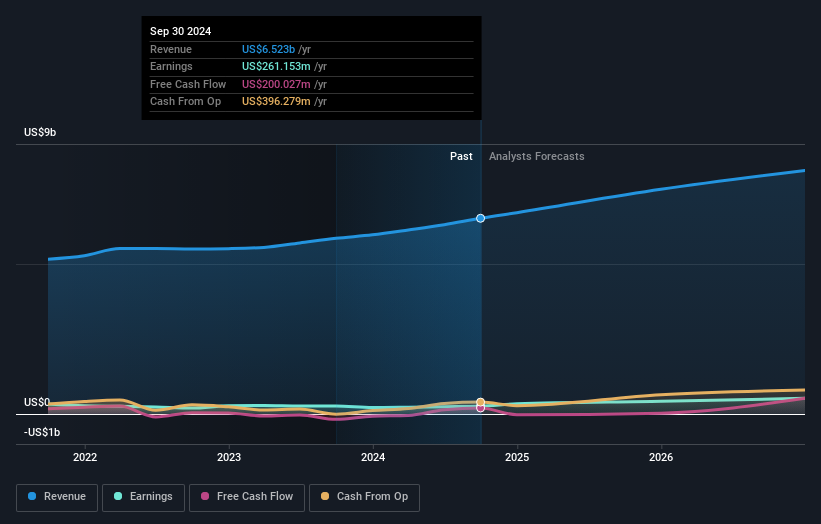- Israel
- /
- Aerospace & Defense
- /
- TASE:ESLT
Elbit Systems Ltd.'s (TLV:ESLT) top owners are private companies with 44% stake, while 34% is held by individual investors

Key Insights
- The considerable ownership by private companies in Elbit Systems indicates that they collectively have a greater say in management and business strategy
- A total of 3 investors have a majority stake in the company with 52% ownership
- Institutional ownership in Elbit Systems is 22%
A look at the shareholders of Elbit Systems Ltd. (TLV:ESLT) can tell us which group is most powerful. We can see that private companies own the lion's share in the company with 44% ownership. Put another way, the group faces the maximum upside potential (or downside risk).
Meanwhile, individual investors make up 34% of the company’s shareholders.
Let's take a closer look to see what the different types of shareholders can tell us about Elbit Systems.
See our latest analysis for Elbit Systems

What Does The Institutional Ownership Tell Us About Elbit Systems?
Many institutions measure their performance against an index that approximates the local market. So they usually pay more attention to companies that are included in major indices.
Elbit Systems already has institutions on the share registry. Indeed, they own a respectable stake in the company. This suggests some credibility amongst professional investors. But we can't rely on that fact alone since institutions make bad investments sometimes, just like everyone does. It is not uncommon to see a big share price drop if two large institutional investors try to sell out of a stock at the same time. So it is worth checking the past earnings trajectory of Elbit Systems, (below). Of course, keep in mind that there are other factors to consider, too.

Elbit Systems is not owned by hedge funds. Our data shows that Federmann Enterprises Ltd. is the largest shareholder with 44% of shares outstanding. For context, the second largest shareholder holds about 4.6% of the shares outstanding, followed by an ownership of 3.1% by the third-largest shareholder.
A more detailed study of the shareholder registry showed us that 3 of the top shareholders have a considerable amount of ownership in the company, via their 52% stake.
While studying institutional ownership for a company can add value to your research, it is also a good practice to research analyst recommendations to get a deeper understand of a stock's expected performance. There is some analyst coverage of the stock, but it could still become more well known, with time.
Insider Ownership Of Elbit Systems
The definition of an insider can differ slightly between different countries, but members of the board of directors always count. The company management answer to the board and the latter should represent the interests of shareholders. Notably, sometimes top-level managers are on the board themselves.
Most consider insider ownership a positive because it can indicate the board is well aligned with other shareholders. However, on some occasions too much power is concentrated within this group.
Our data cannot confirm that board members are holding shares personally. Given we are not picking up on insider ownership, we may have missing data. Therefore, it would be interesting to assess the CEO compensation and tenure, here.
General Public Ownership
The general public-- including retail investors -- own 34% stake in the company, and hence can't easily be ignored. While this group can't necessarily call the shots, it can certainly have a real influence on how the company is run.
Private Company Ownership
It seems that Private Companies own 44%, of the Elbit Systems stock. Private companies may be related parties. Sometimes insiders have an interest in a public company through a holding in a private company, rather than in their own capacity as an individual. While it's hard to draw any broad stroke conclusions, it is worth noting as an area for further research.
Next Steps:
I find it very interesting to look at who exactly owns a company. But to truly gain insight, we need to consider other information, too.
Many find it useful to take an in depth look at how a company has performed in the past. You can access this detailed graph of past earnings, revenue and cash flow.
If you would prefer discover what analysts are predicting in terms of future growth, do not miss this free report on analyst forecasts.
NB: Figures in this article are calculated using data from the last twelve months, which refer to the 12-month period ending on the last date of the month the financial statement is dated. This may not be consistent with full year annual report figures.
Valuation is complex, but we're here to simplify it.
Discover if Elbit Systems might be undervalued or overvalued with our detailed analysis, featuring fair value estimates, potential risks, dividends, insider trades, and its financial condition.
Access Free AnalysisHave feedback on this article? Concerned about the content? Get in touch with us directly. Alternatively, email editorial-team (at) simplywallst.com.
This article by Simply Wall St is general in nature. We provide commentary based on historical data and analyst forecasts only using an unbiased methodology and our articles are not intended to be financial advice. It does not constitute a recommendation to buy or sell any stock, and does not take account of your objectives, or your financial situation. We aim to bring you long-term focused analysis driven by fundamental data. Note that our analysis may not factor in the latest price-sensitive company announcements or qualitative material. Simply Wall St has no position in any stocks mentioned.
About TASE:ESLT
Elbit Systems
Develops and supplies a portfolio of airborne, land, and naval systems and products for the defense, homeland security, and commercial aviation applications primarily in Israel, North America, the Asia-Pacific, Europe, Latin America, and internationally.
Flawless balance sheet with reasonable growth potential.
Similar Companies
Market Insights
Community Narratives


